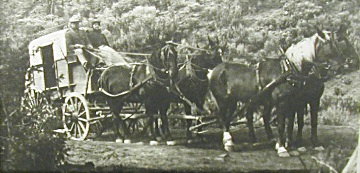HOWARD
HICKSON'S HISTORIES
[Index]
Robin Hoodlums
Northeast Nevada Stage Robberies (1869-1870)
"Throw down the box!" were dreaded words to
leather-popping stagecoach drivers. To the man, they all knew that to resist
was an open invitation to a permanent case of lead-poisoning. The Wells
Fargo and Company strongbox was always hauled out of the front boot and
dropped to the ground.
One of the more popular myths of the Old West
is that most of the highwaymen robbed the rich, in this case Wells Fargo,
and gave to the poor. Not so! More often than not the pillaged lucre went
into the robbers' jeans.
In September, 1869, Hill Beachey's Hamilton
stage was held up by four masked men. When the treasure box yielded nothing
the quartet turned to the lone passenger and demanded he hand over his
money. Lewis Ashlin reluctantly gave the brigands his last five dollars
and told them so. Feeling sorry for him, they handed back $2.50. In this
instance the crooks robbed the poor and then returned half to him. Sounds
like the recent "tax relief" checks from the government.
This wasn't the case when a trio of holdup
men hit the Beachey, Wines and Company Rail Road Stage Line about two miles
out of Elko in the spring of 1870.

A short lesson on stages. They weren't always stage
coaches.
In northeast Nevada a stage could be a wagon, buckboard,
a
stage coach, or, frequently a mudwagon
(shown above).
A mudwagon was suspended like a wagon and was better suited
for our roads. Two of these are on display
at the museum, the better one is just inside the main entrance.
Photograph
from the
collections of the Northeastern Nevada Museum, Elko.
It was almost dusk. Charley Haynes was at the
reins, a bit poetic don't you think? Anyway, Charley was cussing the team
up the side of a ravine when three men stepped from the sagebrush and demanded
the strongbox.
Haynes didn't take any time to debate the
pros and cons of loyalty to the company. He immediately reached under his
seat, grabbed the chest that contained $3,100 with both hands and tossed
it over the side. He was told to drive on. Finding no fault with that order,
Charley cracked his whip. The coach, with its eight passengers, left the
scene in a cloud of dust generated by 24 hooves and four wheels.
Wells Fargo immediately put up a reward of
$1,500 for recovery of the money and $750 for the arrest and conviction
of the dirty perpetrators. Company detectives, noted for their tenacity
and with an arrest record almost equal to the Royal Canadian Mounted Police
up north, descended on Elko, confident they would soon apprehend the culprits.
Elkoans were justly proud when their own,
Sheriff Ben Fitch, solved the case and arrested the robbers. In fact, there
was some snickering around town when Ben beat the big city Wells Fargo
agents to the punch. Within a month of the stickup he had three miners
behind bars in his jailhouse. Arrested were Servetus Quinton, John Watson,
and Washington Waller.
Ben was lenient with his prisoners.
He allowed them to hang illustrated newspapers, like Harper's Weekly, on
the cell walls. He also had the habit of tapping the news sheets daily
to check the condition of the wall behind the papers. On June 14, he routinely
rapped the pages on the wall in Watson's cell and heard only the rustle
of paper. John had found a soft place in the wall and had gone back to
his prior occupation, mining. He had dug a hole all the way to daylight
and was waiting for dark to crawl through to freedom.
About that time, Servetus decided to turn
stoolie and the plight of Watson and Waller became blacker. Servetus escaped
punishment while his partners were sentenced to a quarter of a century
toiling in the sandstone quarry at the state prison at Carson City.
After District Judge George D. Keeney passed
sentence, both men looked relieved. Watson, who had been convinced while
listening to the district attorney that he deserved hanging, approached
the judge and thanked him for being so lenient.
Howard Hickson
July 27, 2001
Source: Various issues of the Elko Independent,
1869-1870.
©Copyright 2001 by Howard Hickson. Permission
to use is given but, if any portion or the entire article is quoted, proper
credit must be given.
[Back to Hickson's Histories Index]
|
